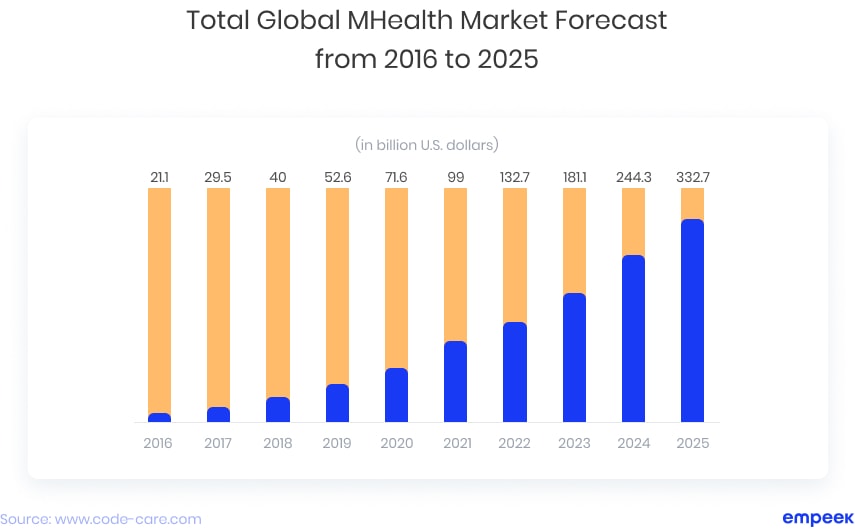Did you know the mHealth solutions market is expected to reach $213.6 billion by 2025? This growth is driven by the increasing number of mHealth apps, which have surpassed fitness and productivity apps in terms of numbers.
In this article, we will explore the revenue growth drivers and various business models for mobile health, helping you determine the optimal approach for generating income from your solution.

While being significantly regulated by healthcare law, mhealth patient engagement increases interest in access to healthcare resources yet are in high demand. Depending on your target audience (patients, healthcare organizations, or insurance companies), the mobile health business model will differ. How to choose an effective mobile health revenue model? Which direction is more beneficial mhealth vs telehealth. Find everything you need to know on mHealth business revenue models, which types of mhealth app will be the most beneficial for your business, and the healthcare app development trends in the article below.
Types of Business Models in Healthcare
When it comes to the mhealth business, there is no one-size-fits-all solution. Some patients try to figure out the difference between mHealth vs telemhealth. mHealth vs Telehealth. All mhealth app business models are different. The revenue model you choose depends on your target audience, business goals, and the resources you already possess.
Freemium Model
The ‘freemium’ model is one of the most common mobile health business models. In this model, the app developer beta-tests the product by attracting a vast target audience. This approach is especially popular among game developers when a newly launched game is a product the online community uses and posts reviews about. The further stage is upgrades for fees, for instance, a no-ad option.
Legacy Approach or Licensure Model
In general, licensing is a traditional approach when it comes to agreements between the tech giants and new players in the industry. This type is among perfect business models for healthcare apps requiring the collection of customers’ personal data. New startups that choose to cooperate with already existing IT products or so-called ‘legacy’ products get a right to use the software tools legally while paying a low use fee. By doing so, both sides benefit from the business agreement.
The New Opportunity Approach
Health providers or health insurance companies will make the target audience if you choose this model among other business models for mhealth. How to make money while cooperating with health insurers? Once your mhealth app gets approved by FDA, you must contact healthcare organizations and persuade the physicians to prescribe your app to patients as a part of the treatment plan.
A perfect example of the reimbursement approach is WellDoc’s BlueStar app which physicians prescribe to patients suffering from diabetes. As a result, the app’s owners are paid by healthcare organizations that have integrated the app into the diabetes therapeutic program.
Sometimes, business analysts define four more types of mobile health app revenue models apart from the approaches listed above. Meanwhile, the approaches below are based on strong cooperation with MNOs.
Bitpipe Provider
In this healthcare revenue model, the only requirement from a mobile network operator is connectivity. This approach does not include customization features. Instead, it focuses only on data transmission.
‘Enabler’- Connectivity Provider
This is where platforms and connectivity are at high stakes when it comes to cooperation with MNOs. In this case, businesses place a high value on security and the management of SIMs.
‘Joint Partner’
Here, an MNO becomes practically a partner of the developing company. Together, they work on the development of services, billing options, platforms, etc.
‘White Label Partner’ or ‘Lead Partner’
Like in the ‘joint partner’ model, the MNO cooperates with the developer on the creation of platforms and services. In this case, they create customized and endwise solutions. For instance, hardware or platform development.

How to Choose an Efficient Revenue Model
Mobile health app business models are an important part of your monetization strategy. While choosing an mobile health revenue model, pay attention to the following factors:
- Your knowledge on how customers and healthcare organizations purchase mhealth app development services;
- Know your customer – for instance, the older generation is less tech-savvy that potential Millennial users;
- Some self-funded hospitals and tradition-oriented healthcare employers might resist the adoption of new tech products.
If you plan to generate revenue from advertising services, choose a freemium model. Once the project grows, pharma companies will start targeting your site as a potential platform for advertising their products and services. Also, a freemium revenue model is perfect for medical startups who plan on working with commercially valuable customer data.
If you already have a vast target audience and an endwise product, you may apply the legacy model. Meanwhile, a freemium model is perfect for startups that need to collect first-hand reviews of the users for the follow-ups.
If your app focuses on diabetes and weight loss, consider the reimbursement approach. For instance, based on the number of reduced hospital visits, the user might get an insurance ‘cashback.’ Nonetheless, you should always remember that this approach is highly risky and time-consuming. Visit our additional article to find out the barriers to mhealth adoption.
Consider Empeek Your Trusted Partner in Mobile Health Business Model Issues
Empeek is a community of creative tech innovators who are inspired to develop mhealth solutions that improve the global healthcare system. By choosing us, you enhance your data security and improve your business operations.
One of Empeek’s most complex projects was the development of a cardiac care mobile device. The main challenge that the customer experienced was the use of ineffective third-party services based on subscription. Our specialists have developed a Holter-type monitor that records heart activity. The device includes a two-way IoT integration and can stream the heart-related data in ECG graphs.
Another project is the development of a real-time monitoring system that detects and records vital signs and later transmits them to the hospital. Meanwhile, the app has a ‘reminder’ feature and scalable cloud storage. It also gives an opportunity to hospitals to monitor an unlimited number of patients.
Got an idea for a life-saving start-up? Contact our Empeek specialists to get the best tech assistance!








